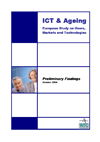 This document presents preliminary outcomes of an ongoing study entitled "ICT & Ageing - Users, Markets and Technologies". This two year research endeavour was launched in the beginning of 2008 by the European Commission, DG Information Society and Media. The general background to this study derives from the trend towards accelerating population ageing as it has been observed across Europe and beyond for some time already.
This document presents preliminary outcomes of an ongoing study entitled "ICT & Ageing - Users, Markets and Technologies". This two year research endeavour was launched in the beginning of 2008 by the European Commission, DG Information Society and Media. The general background to this study derives from the trend towards accelerating population ageing as it has been observed across Europe and beyond for some time already. In Europe, average life expectancy has increased from 55 years in 1920 to over 80 years today. With the retiring baby boom generation the number of people aged between 65 and 80 years is expected to rise by nearly 40% between 2010 and 2030.2 For Europe and many other countries around the world, the ongoing demographic development has significant socio-economic implications: in the future, there will be more older people in absolute as well as relative terms, there will be considerably more old people particularly in the upper age range, there will be fewer family carers providing informal support to these, and there will be a smaller productive workforce to contribute to the creation of economic wealth in general and to the financing of health and social services in particular.
Download ICT & Ageing - European Study on Users, Markets and Technologies Preliminary Findings (.pdf, 694 KB).
Download from the eHealthNews.EU Portal's mirror: ICT & Ageing - European Study on Users, Markets and Technologies Preliminary Findings (.pdf, 694 KB).
For further information, please visit:
http://www.ict-ageing.eu
Related news articles:
- empirica's Profile
About empirica
empirica Gesellschaft für Kommunikations- und Technologieforschung mbH (empirica) has many years of experience in quantitative and qualitative research methods. Its clients are private companies and public bodies: large and medium-sized companies in the insurance, pharmaceutical and automobile industries as well as software developers and hardware manufacturers. There are also telecommunications service companies and network providers, social services firms, medical facilities, Federal and State Government ministries in Germany and the European Commission as well as the European statistical office (Eurostat). For further information, please visit www.empirica.com.